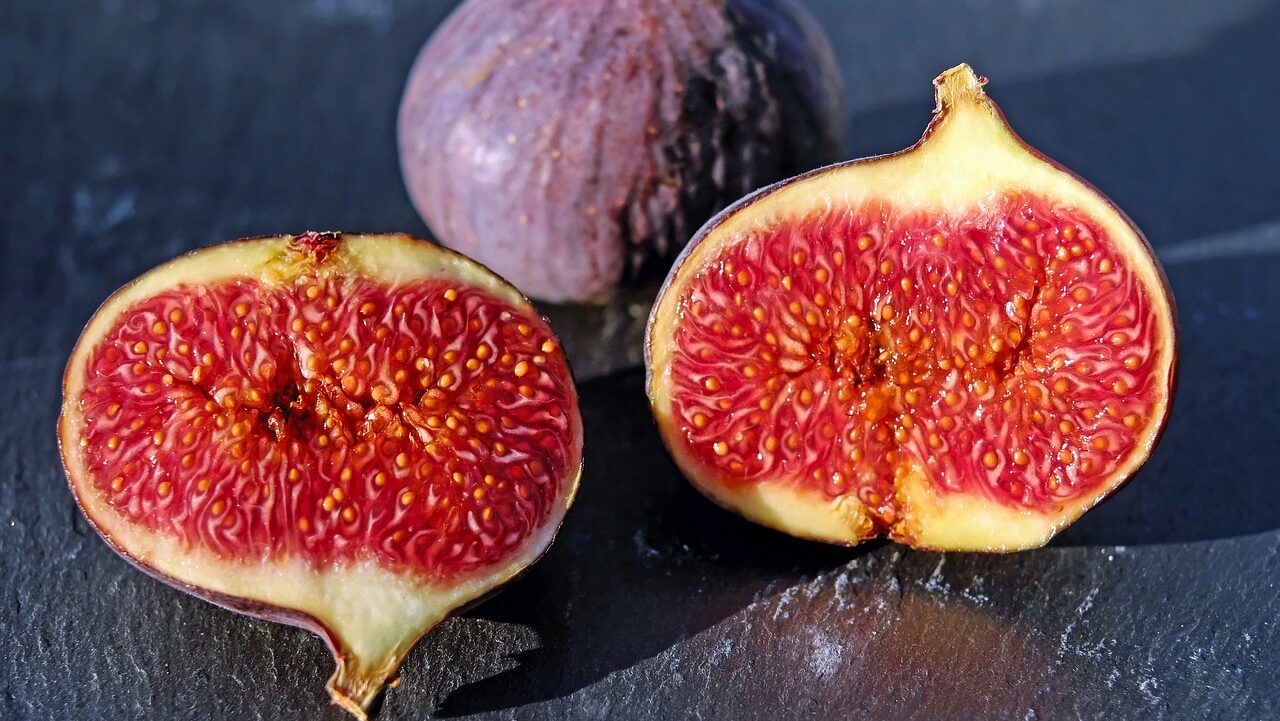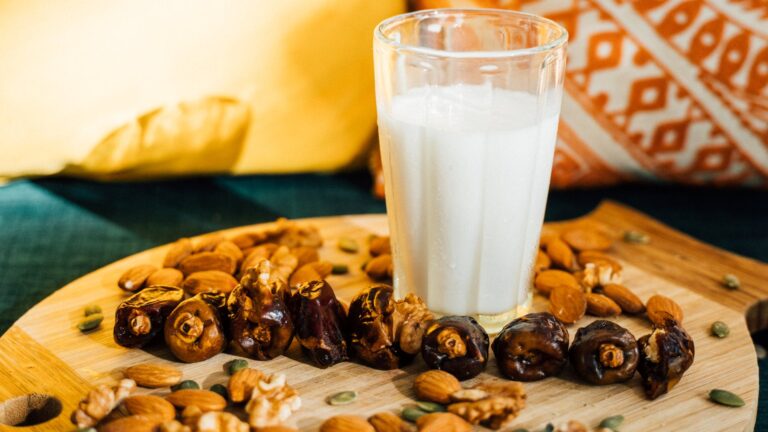Figs, known scientifically as Ficus carica, are not only a delectable fruit but also a powerhouse of nutrition, offering a multitude of health benefits that can enhance your well-being in various ways. This guide delves deep into the health benefits of figs and the myriad advantages of incorporating figs into your diet, shedding light on their nutritional profile, health benefits, and versatile uses in culinary practices.
Health Benefits of Figs: Varieties and Facts
Figs come in various types, each offering unique flavors, colors, and characteristics, all contributing to the myriad health benefits of this nutritious fruit.
- Black Mission Fig: This variety, with its dark purple to black skin and vibrant pink flesh, not only tantalizes the taste buds but also packs a punch in terms of health benefits. Rich in fiber, potassium, and other essential nutrients, Black Mission Figs support digestive health, aid in controlling blood pressure, and contribute to overall well-being.
- Brown Turkey Fig: With its brownish-purple skin and mild, sweet flavor, the Brown Turkey Fig provides not only a delicious snack but also a plethora of health benefits. High in fiber and natural sugars, this variety helps regulate digestion, provides a quick energy boost, and supports heart health.
- Kadota Fig: Featuring light green skin and amber flesh, Kadota Figs offer a delicate sweetness along with significant health benefits. Packed with antioxidants, vitamins, and minerals, Kadota Figs contribute to cellular health, support the immune system, and promote radiant skin.
- Calimyrna Fig: Known for its pale yellow-green skin and nutty flavor, the Calimyrna Fig is a nutritional powerhouse. Loaded with calcium, magnesium, and other minerals, Calimyrna Figs strengthens bones, improves muscle function, and aids in maintaining electrolyte balance.
- Adriatic Fig: With its green skin and light pink interior, the Adriatic Fig not only delights the palate but also offers numerous health benefits. Bursting with antioxidants, vitamins A and K, and other bioactive compounds, Adriatic Figs help combat oxidative stress, support vision health, and boost the immune system.
- Celeste Fig (Sugar Fig): Small in size but big on sweetness, Celeste Figs are a treasure trove of health benefits. Rich in iron, potassium, and dietary fiber, Celeste Figs promotes red blood cell production, regulates blood pressure, and aids in digestion.
- Panachee Fig (Tiger Fig): Sporting striped green and yellow skin, Panachee Figs not only catch the eye but also offer significant health benefits. Packed with vitamins, minerals, and antioxidants, Panachee Figs contribute to overall health, enhance skin complexion, and support weight management.
- Osborne Fig: Characterized by its dark purple skin and red interior, the Osborne Fig is a nutritional powerhouse. High in antioxidants, such as vitamin C and polyphenols, Osborne Figs help fight inflammation, protect against chronic diseases, and promote longevity.
Anjeer (Dried Figs) Fresh & Natural Anjir Dry Fruits
Rich in Iron, Vitamins & Rich Source of Dietary Fiber | Low in calories and Fat-Free
Hygienically packed in facility meeting food safety standards.
Rich Source of Natural Nutrients. Healthy and Smart Snack Choice.
Incorporating a variety of figs into your diet can provide a wide range of health benefits, from supporting digestive health and boosting immunity to promoting heart health and enhancing overall well-being. So, indulge in the deliciousness of figs while reaping their incredible health rewards.
Did You Know?
- Figs boast a rich history dating back 6000 years and have been a staple fruit in the Mediterranean diet. [source: ncbi.nlm.nih.gov]
- Figs possess antioxidant capacity and other functional properties that contribute to their health benefits. [source: ncbi.nlm.nih.gov]
- Figs contain a diverse array of bioactive components, including flavonoids, phenolic acids, carotenoids, and tocopherols. [source: ncbi.nlm.nih.gov]
- Animal and human studies suggest that figs and their extracts may have positive effects on blood pressure, high-density lipoprotein (HDL) levels, irritable bowel syndrome (IBS), and triglyceride levels. [source: ncbi.nlm.nih.gov]
The health benefits of figs are vast and varied, from promoting digestive health and heart health to strengthening bones, regulating blood sugar levels, and supporting weight management. By incorporating figs into your diet, you can enjoy not only their delicious taste but also the numerous nutritional benefits they offer.
Nutritional Profile of Figs
Figs are a rich source of vitamins, minerals, and dietary fibers, essential components that contribute to their health-promoting properties. Here's a closer look at what these luscious fruits have to offer:
- Dietary Fiber: Figs are high in fiber, which aids in promoting digestive health, enhancing satiety, and regulating blood sugar levels.
- Vitamins: They are a good source of vitamins A, B1, B2, and K, contributing to vision health, energy production, and blood clotting.
- Minerals: Figs are rich in essential minerals such as calcium, magnesium, potassium, and iron, supporting bone health, muscle function, cardiovascular health, and oxygen transport.
Health Benefits of Figs
Promoting Digestive Health
The high fiber content in figs helps in maintaining a healthy digestive system, preventing constipation, and promoting regular bowel movements.
Enhancing Heart Health
Figs are beneficial for heart health due to their potassium content, which helps in controlling blood pressure levels. Additionally, their fiber aids in reducing blood cholesterol levels, further protecting the heart.
Strengthening Bones
Rich in calcium and magnesium, figs support bone density and strength, playing a crucial role in preventing osteoporosis and enhancing overall bone health.
Regulating Blood Sugar Levels
The fiber in figs assists in moderating blood glucose levels, making them a valuable addition to the diet of individuals managing diabetes.
Boosting Immune System
Vitamins A and K, along with other antioxidants present in figs, contribute to boosting the immune system and protecting the body against infections.
Supporting Weight Management
The fiber content in figs not only promotes satiety, reducing the likelihood of overeating but also contributes to a balanced diet, aiding in weight management efforts.
Culinary Uses of Figs
Figs are incredibly versatile in culinary applications, ranging from fresh salads to decadent desserts. They can be used in their fresh form, dried, or as preserves, adding a burst of sweetness and texture to various dishes.
Fresh Figs
- Salads: Fresh figs add a sweet note to salads, pairing well with greens, nuts, and cheeses.
- Desserts: Their natural sweetness enhances desserts, perfect for tarts, cakes, and pastries.
Dried Figs
- Snacks: Dried figs are a nutritious snack option, providing a concentrated source of energy and nutrients.
- Cooking: They can be rehydrated and used in savory dishes, adding depth and sweetness to sauces and meats.
Incorporating Figs into Your Diet
Adding figs to your diet is a delightful way to enrich your nutritional intake. Whether consumed fresh, dried or as part of various recipes, figs can enhance the flavor profile of your meals while offering significant health benefits.
Comparison Between Figs and Dates
| Properties | Figs | Dates |
|---|---|---|
| Natural Sweetness | Figs are renowned for their sweet and mildly nutty flavor, offering a distinct taste of natural sweetness. | Dates also possess natural sweetness with a caramel-like taste, making them a favored choice for natural sweetening purposes. |
| Caloric Content | Figs have a moderate calorie content, suitable for those watching their calorie intake, providing a satisfying snack option. | Dates, slightly higher in calories due to their natural sugars, offer a quick energy boost for active individuals. |
| Fiber Content | Figs are an excellent source of dietary fiber, aiding in digestion and weight management by promoting a healthy gut. | Dates are rich in fiber, supporting digestive health and preventing constipation, contributing to overall well-being. |
| Mineral Content | Figs contain essential minerals like potassium, magnesium, and copper, essential for maintaining overall health. | Dates are rich in minerals, particularly potassium, crucial for heart health and maintaining proper hydration levels. |
| Iron Content | Figs offer a moderate amount of iron, beneficial for individuals seeking to increase their iron intake naturally. | Dates serve as a good source of iron, providing a natural way to boost iron levels within the body. |
| Antioxidant Properties | Figs contain antioxidants such as vitamin A, aiding in cellular health and bolstering the immune system. | Dates boast high antioxidant levels, assisting in combating oxidative stress and inflammation in the body. |
| Culinary Versatility | Figs are versatile and can be enjoyed fresh, dried, or incorporated into various culinary creations like salads and desserts. | Dates are commonly consumed in their natural form but are also utilized in baking, particularly in energy bars and desserts. |
| Nutrient Density | Figs offer a plethora of nutrients within a low-calorie framework, making them an excellent choice for nutrient-rich eating. | Similarly, dates are nutrient-dense, supplying essential vitamins and minerals crucial for overall well-being. |
Conclusion
In conclusion, figs are a nutritional powerhouse with a wide array of health benefits. By understanding their nutritional profile and incorporating them into your diet, you can take a delicious step towards a healthier lifestyle.





